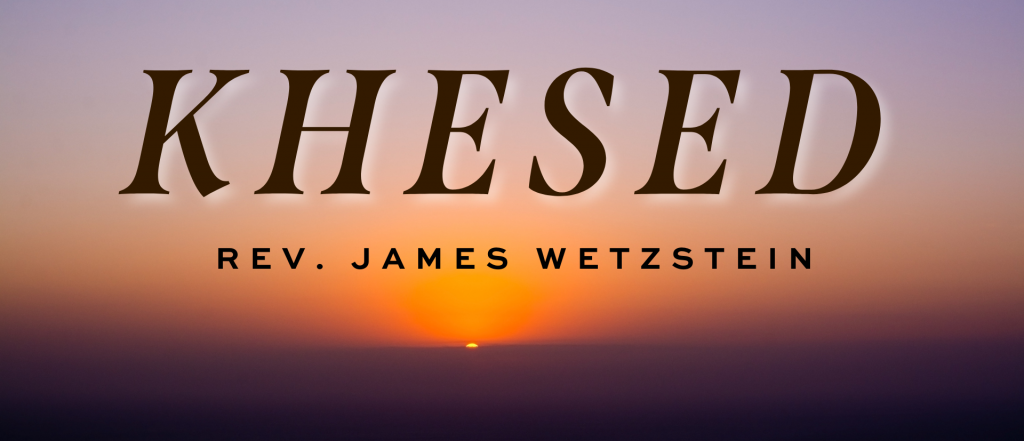KHESED

A word frequently used in the Bible (about 250 times), is so heavy with meaning that every English translation choice leaves some nuance of meaning unexpressed. The New Revised Standard Version (NRSV) translation frequently translates the Hebrew word KHESED by the phrase “steadfast love”(e.g., Genesis 32:10). Other times, it’s “everlasting love” (e.g., Isaiah 54:8). Other translations offer “lovingkindness.” Depending on the context, it’s also rendered as “loyalty” (Ruth 3:10) or “mercy” as in the well-known verse, Psalm 23:6, “Surely goodness and mercy shall follow me all the days of my life.”
Most often, the one who is expressing KHESED is Yahweh, the God of Abraham, Isaac, and Jacob, However, as in Ruth’s case, humans can be known for their KHESED. And it is assumed that KHESED will be mutual. Loyalty from one towards another begets loyalty in return. KHESED is always most fully expressed in relationships.
And there’s more. Not readily apparent in any of these translation choices is that KHESED, while a central aspect of Yahweh’s character, is not simply governed by that character, nor is it governed by the reciprocity of the KHESED relationship. It is governed by a covenant or contract between the parties held together in KHESED. This covenant is real and authentic apart from the actions and attitudes of those involved. Thus, when Yahweh ran out of patience with the people under Moses’ leadership, Moses interceded for them by appealing to Yahweh’s covenant-bound KHESED.
Another striking appeal to Yahweh’s KHESED occurs in the middle of a collection of poems called Lamentations. It is five poems that express, in vivid detail, the suffering and sorrow caused by the siege and destruction of Jerusalem by the Babylonian Empire in 586 BCE. Yet, about halfway through this lament, the poet writes:
The steadfast love of the Lord never ceases,
his mercies never come to an end;
they are new every morning;
great is your faithfulness. (Lamentations 3:22-23)
And here’s the part that challenges our imagination. The poet has already acknowledged that their destruction is due to the failure of the peoples’ KHESED toward their God. By their actions they have been living as though the covenant didn’t exist. They interpret their suffering as a punishment.
Here’s the hard part: In doing so, they find hope because Yahweh had not forgotten the covenant. Though they have forgotten the covenant, they interpret their suffering under Babylon as evidence that Yahweh has not. Yahweh remains engaged. Though they ignored their God, their God is not ignoring them. The KHESED contract remains. There is still room for hope.
Awful suffering still happens in all of creation. While the Lamenting poet interpreted their suffering as coming directly from the hand of God, we ought not do the same. Here’s why:
Yahweh’s KHESED is so great that it comes to be expressed in the person of Jesus, who is God come to join us, even in suffering. Jesus calls this solidarity with an often-suffering creation a “new covenant.” We celebrate this iron-clad, or more precisely, human-clad, covenant Sunday mornings and Wednesday nights at the Chapel of the Resurrection when we come into the presence of Jesus who invites us to dine with him, saying: “This cup is the new covenant in my blood, shed for you and for all people for the forgiveness of sin.” The covenant to which Jesus binds himself calls out our KHESED failure and answers it with his own KHESED commitment. “Great is your faithfulness.”
Pr. Jim
Rev. Katherine Museus and Rev. James A. Wetzstein serve as university pastors at the Chapel of the Resurrection at Valparaiso University and take turns writing weekly devotions.
November 12, 2024
1. Also rendered HESED or CHESED.
- James Wetzstein
- The Wonder of Resurrection
- Forgiveness: The Necessary Miracle
- Everything Happens for a Reason or Does It?
- Of Groundhogs and Divine Love
- When You Pass Through the Fire…
- KHESED
- Psalm 46 – When There’s Trouble, God Can Always Be Located
- Who Are Your Beatitudes Mentors?
- The Posture of Gratefulness
- Like a Mirror of Eternal Truth
- “Light” and Other “L” Words
- Keeping Up with the Holy Spirit
- It’s a Three Day Weekend!
- Divine Love Can’t Quit You
- I Had a Bit of a Moment
- What to do When Our Resolutions Don’t Deliver
- Have Yourself a Merry Little Christmas (Somehow)
- Adventing in the Meantime
- Life and Death Collisions
- Imagining Eternity
- Where is God for You?
- All You Need Is Love, Love Is All You Need
- God Uses Crooked Sticks to Draw Straight Lines
- “Reset/Refresh” Sabbath as rest, not distraction